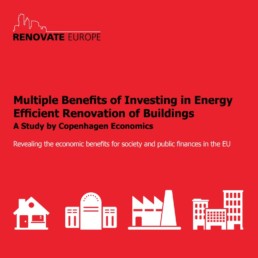11 October 2012
EU institutions raise pressure for buildings renovation
The buildings sector will benefit from new legislation and guidelines to increase the renovation of EU buildings stock, according to energy commissioner Günther Oettinger. MEP Peter Liese says renovation is a more affordable way to tackle climate change than paying for renewables. Brussels – The buildings sector will benefit from new legislation and guidelines to increase the renovation of EU buildings stock, according to energy commissioner Günther Oettinger. Oettinger today welcomed a recent construction sector strategy report from enterprise commissioner Antonio Tajani, which encourages…
11 October 2012
Renovating Europe’s buildings could boost GDP by €291 billion by 2017
Investing in building renovation could accrue up to €175 billion per year for public finances with an additional “one-off” boost to GDP in the range of €153 to €291 billion for the years up to and including 2017. This is according to a new report prepared by Copenhagen Economics for the Renovate Europe Campaign. The report which was launched at today’s Renovate Europe Day Conference2 , shows that when the challenge of renovating the EU building stock is taken up with a high level of ambition, permanent increases in revenue for public finances will result. The report also provides a number of…
10 October 2012
Croatian Press
Green Energy site: http://www.zelenaenergija.org/hrvatska/clanak/sutra-je-renovate-europe-day-dan-obnove-europe/4488 Build Site: http://www.gradimo.hr/clanak/sutra-je-renovate-europe-day-bdquo-dan-obnove-europe-ldquo/87483
5 October 2012
IMPACT ON PUBLIC FINANCES
A STUDY BY COPENHAGEN ECONOMICS Released at Renovate Europe Day, 11 October 2012 The Renovate Europe Campaign reached out to 28 Finance Ministers to highlight the Multiple Benefits of Investing in Energy Efficient Renovations as outlined in this Report. Download the Key Messages Brochure Download the Full Report and Appendix
30 August 2012
Energy Efficiency Policies in Buildings – the Use of Financial Instruments at Member State Level
The BPIE report highlighted the complexity of the sector in large part because Member States had over decades separately developed their buildings sectors in terms of policies, design and construction techniques. The report showed a mosaic of building cultures and policies. Policy-making cannot be undertaken effectively in a knowledge vacuum. With buildings representing about 40% of energy consumption and almost the same level of GHG emissions, there is a need for a strong analytical foundation for policy-making, particularly when there are priority policy concerns such as energy security and…
15 June 2012
The Energy Efficiency Directive – Ready for Take-Off if Member States Act Decisively
Will the Energy Efficiency Directive, as agreed by the Member States, the European Parliament and the European Commission on the 13th June fly? It has elements in it that could, if properly and fully implemented at Member State level, see increased energy efficiency take-off, but its propositions on building renovations will not contribute as much as they could to the voluntary target of a 20% increase in energy efficiency by 2020! For the existing EU building stock, the text is not as ambitious as it could have been as the Member States remain unconvinced about the huge social, environmental…



